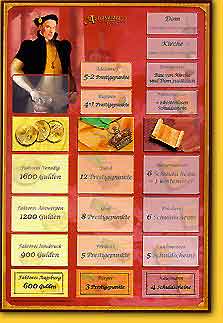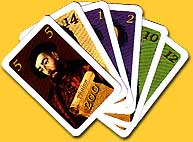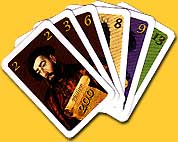Augsburg 1520
page 2
| x |
|
|
|
|
|
|
|
|
|
|
|
|
|
|
|
|
|
|
|
|
|
|
|
|
|
|
|
|
|
|
|
|
|
|
|
|
|
|
|
|
|
|
|
|
|
|
|
|
|
|
 |
Another snake in the grass is that in all three categories, there are not enough level tiles available for all players. If a player has the right to take a level tile that is no longer available, he may steal it from an opponent of his choice. The compensation of 100 guilders or 1 prestige point that the robbed player receives is a cold comfort.
When the winner of the first auction has performed his two privileges, the party visits the next noble, Louise. Again, players bid with their promissory notes. The winner of this auction may choose from the remaining four privilege cards. Similarly, Leo, Maria and Maximilian are visited. The latter has a special feature; there are no promissory notes with the portrait of Maximilian, but players may bid with the promissory notes with portraits of any of the other four nobles.
|
| x |
|
|
|
|
|
|
|
|
|
|
|
|
|
|
|
|
|
|
|
|
|
|
|
|
|
|
|
|
|
|
 |
When the last auction is over, all players receive money, prestige points and promissory notes corresponding to their highest level tiles in the three categories. Again, a player may decide how many of the promissory notes he buys. The game ends after four (with two players) to seven (with five players) rounds, and the winner is the player with most prestige points.
|
 |
|
|
|
|
|
|
|
|
|
|
|
|
|
|
|
|
|
|
|
|
|
|
|
|
|
|
|
|
|
|
|
|
|
|
|
|
|
|
|
|
|
|
|
|
|
|
|
It is very important to make progress in all three categories. The need for prestige points is obvious, but in addition, money is essential to buy promissory notes, and the promissory notes are crucial to win auctions and perform privileges. A balanced strategy is therefore required. A disadvantage is that the level tiles can be stolen by other players, and sometimes you’re just trying to restore your old situation instead of making actual progress. The stealing also has the effect that the players are usually close together on the scoring track; if something has to be stolen, a player will take it from the leading opponent.
|
|
|
| x |
|
|
|
|
|
|
|
|
|
|
|
|
|
|
|
|
|
|
|
|
|
|
|
|
|
|
|
|
|
|
|
|
|
|
|
|
|
|
|
|
|
|
|
|
|
|
|
|
|
|
 |
When all players approach the 25 points-barrier, they want to buy a church to be able to pass this barrier; at that moment, the privilege cards depicting an ‘offices’ privilege are suddenly extremely popular. Then, it is important to win one of the first auctions, so the desired card is still available and you have first choice. In such times, the Philipp-cards can be more valuable than for example the Maria-cards, because Phillipp is always visited first.
|
| x |
|
|
|
|
|
|
|
|
|
|
|
|
|
|
|
|
|
|
|
|
|
|
|
|
|
|
|
|
|
|
|
|
|
|
|
|
|
|
|
|
|
|
|
|
|
|
|
|
|
|
|
That brings us to the role of luck: there’s the different characters, but all cards also have different values. Sometimes four cards with a low value, that are easily affordable, are of more use than two (expensive) cards with high values. The value is only important when all players place the same bid; in all other cases, only the number of cards is relevant. More cards can be earned by progressing in the ‘offices’ category, some of them even for free. The more cards, the more choice, so the importance of the ‘offices’ track must not be underestimated!
|
 |
| x |
|
|
|
|
|
|
|
|
|
|
|
|
|
|
|
|
|
|
|
|
|
|
|
|
|
|
|
|
|
|
|
|
|
|
|
|
|
|
|
|
|
|
|
|
|
|
|
|
|
|
|
|
A disadvantage of Augsburg is that in the final round, money and cards are worthless. In phase two of the final round, only prestige points are scored. This implies that the tracks ‘agencies’ and ‘offices’ are suddenly useless, and all players will want to ascend the ‘peerage’ track. The winners of the last two or three auctions then have no useful actions to perform, because without a doubt the ‘peerage’ privilege cards have already been chosen by the winners of the first auctions of this round.
|
| x |
|
|
|
|
|
|
|
|
|
|
|
|
|
|
|
|
|
|
|
|
|
|
|
|
|
|
|
|
|
|
|
|
|
|
|
|
|
|
|
|
|
|
|
|
|
|
|
|
|
|
Augsburg 1520 is a light weight auction game; there is enough room for tactics, but it’s not extremely heavy. It plays best with four or five players, but with two or three players it also functions well.
© 2006 Barbara van Vugt
Augsburg 1520, Karsten Hartwig, Alea/Ravensburger, 2006 - 2 to 5 players, 12 years and up, 25 to 75 minutes
|
|
|
  |
|
|
|
|
|
|
|
|
|
|
|
|
|
|
|
|
|
|
|
|
|
|
|
|
|
|
|
|
|
|
|
|
|
|
|
|
|
|
|
|
|
|
|
|
|
|
  |
|
|
|
|
|
|
|
|
|
|
|
|
|
|
|
|
|
|
|
|
|
|
|
|
|
|
|
|
|
|
|
|
|
|
|
|
|
|
|
|
|
|
|
|
|
|
  |
|
|
|
|
|
|
|
|
|
|
|
|
|
|
|
|
|
|
|
|
|
|
|
|
|
|
|
|
|
|
|
|
|
|
|
|
|
|
|
|
|
|
|
|
|
|
  |
|
|
|
|
|
|
|
|
|
|
|
|
|
|
|
|
|
|
|
|
|
|
|
|
|
|
|
|
|
|
|
|
|
|
|
|
|
|
|
|
|
|
|
|
|
|
  |
|
|
|
|
|
|
|
|
|
|
|
|
|
|
|
|
|
|
|
|
|
|
|
|
|
|
|
|
|
|
|
|
|
|
|
|
|
|
|
|
|
|
|
|
|
|
  |
|
|
|
|
|
|
|
|
|
|
|
|
|
|
|
|
|
|
|
|
|
|
|
|
|
|
|
|
|
|
|
|
|
|
|
|
|
|
|
|
|
|
|
|
|
|
| x |
|
|
|
|
|
|
|
|
|
|
|
|
|
|
|
|
|
|
|
|
|
|
|
|
|
|
|
|
|
|
|
|
|
|
|
|
|
|
|
|
|
|
|
|
|
|
|
|
|
|
| x |
|
|
|
|
|
|
|
|
|
|
|
|
|
|
|
|
|
|
|
|
|
|
|
|
|
|
|
|
|
|
|
|
|
|
|
|
|
|
|
|
|
|
|
|
|
|
|
|
|
|
 |
|
|
|
|
|
|
|
|
|
|
|
|
|
|
|
|
|
|
|
|
|
|
|
|
|
|
|
|
|
|
|
|
|
|
|
|
|
|
|
|
|
|
|
|
|
|
 |
|
|
|
|
|
|
|
|
|
|
|
|
|
|
|
|
|
|
|
|
|
|
|
|
|
|
|
|
|
|
|
|
|
|
|
|
|
|
|
|
|
|
|
|
|
|
 |
|
|
|
|
|
|
|
|
|
|
|
|
|
|
|
|
|
|
|
|
|
|
|
|
|
|
|
|
|
|
|
|
|
|
|
|
|
|
|
|
|
|
|
|
|
|
| x |
|
|
|
|
|
|
|
|
|
|
|
|
|
|
|
|
|
|
|
|
|
|
|
|
|
|
|
|
|
|
|
|
|
|
|
|
|
|
|
|
|
|
|
|
|
|
|
|
|
|
 |
|
|
|
|
|
|
|
|
|
|
|
|
|
|
|
|
|
|
|
|
|
|
|
|
|
|
|
|
|
|
|
|
|
|
|
|
|
|
 |
|
|
|
|
|
|
|
|
|
|
|
|
|
|
|
|
|
|
|
|
|
|
|
|
|
|
|
|
|
|
|
|
|
|
|
|
|
|
|
|